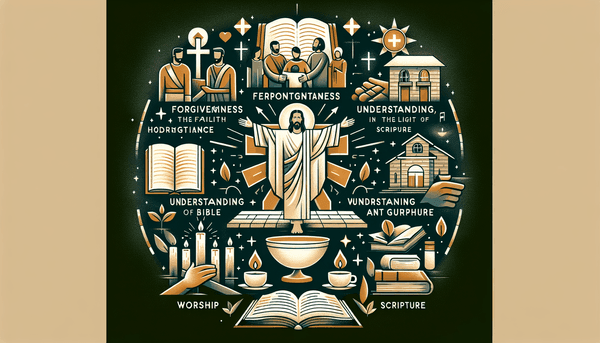Crafting a Daily Prayer Routine
Establishing a daily prayer routine is like opening the windows of heaven, allowing the light of God's presence to illuminate our lives. It is in the stillness of each day that we can truly sense the gift of life, the breath that sustains us, and the grace that encompasses us. Like the psalmist who cherished God's Word as a lamp unto their feet and a light unto their path (Psalm 119:105), we too can use scripture to guide our prayers. Gratitude plays a pivotal role as we reflect on God's mercies, which are new every morning (Lamentations 3:22-23), and as we lay down our burdens, we find peace that surpasses all understanding (Philippians 4:7). Trusting in His plan (Romans 8:28) and keeping our minds steadfast on Him (Isaiah 26:3), our prayer life becomes a testament to the enduring faithfulness of God.
Understanding the Role of Jesus as Mediator
In the tapestry of Christian faith, Jesus Christ is the golden thread that binds humanity to the divine. He is the sole mediator between us and God (1 Timothy 2:5), standing in the gap with arms outstretched. Christ's mediation is not merely a theological concept; it is the very essence of our prayers. As He lives to intercede for us (Hebrews 7:25), we direct our prayers to God through Him, knowing that He is the way, the truth, and the life (John 14:6). This understanding instills in us the confidence to approach God's throne with boldness (Hebrews 4:14-16), and as we acknowledge Jesus as our advocate (1 John 2:1), our prayers become a reflection of our relationship with the Savior.
The Spiritual Reality of Believers in Christ
As believers, we are part of a spiritual reality that transcends the physical realm. We are invited to Mount Zion, the city of the living God, the heavenly Jerusalem (Hebrews 12:22-24). In this spiritual assembly, we join angels and the church of the firstborn, all united by the transformative power of Jesus' sacrifice. As the mediator of a new covenant, His blood speaks a better word than the blood of Abel, offering redemption and the promise of an eternal inheritance. The imagery of the heavenly Jerusalem (Revelation 21:2-3) and the new covenant (Hebrews 9:15) reminds us of our redemptive narrative, where we, through Christ's precious blood (1 Peter 1:18-19), are made into a kingdom of priests to serve our God (Revelation 5:9-10).
The Ethics of Prayer and Whom We Pray To
The landscape of prayer is vast and nuanced, yet Scripture provides us with clear guidance on its ethics. As followers of Christ, we are encouraged to pray directly to God through Jesus Christ (Matthew 6:6), ensuring that our prayers align with biblical teachings. While some traditions advocate for praying to saints, the New Testament urges us to ask the Father in Jesus' name (John 16:23-24). Understanding the proper recipient of our prayers is crucial, as it affects the integrity and effectiveness of our spiritual communication. As we pray for all people (1 Timothy 2:1-2), in the Spirit on all occasions (Ephesians 6:18), we are reminded of the power of a righteous person's prayer (James 5:16).
The Pursuit of Righteousness and Its Implications for Prayer
In the pursuit of righteousness, our prayers become a beacon of God's will on earth. Hungering for righteousness (Matthew 5:6) aligns our hearts with the divine, fostering a life that reflects the righteousness of Christ (2 Corinthians 5:21). This spiritual quest not only transforms our personal growth but also the very essence of our prayers. As we sow the seeds of peace and harvest the fruit of righteousness (James 3:18), our prayers are filled with the fruit of righteousness that comes through Jesus Christ (Philippians 1:11). In this kingdom of righteousness, peace, and joy in the Holy Spirit (Romans 14:17), our prayers echo the deepest yearnings for a world touched by God's renewing grace.
Conclusion
Prayer is the heartbeat of a vibrant spiritual life, a daily discipline that draws us closer to the heart of God. Reflecting upon Jesus' role as our mediator and the spiritual realities that shape our prayer experiences, as discussed in this article, we are reminded of our need to align our thoughts with God's will, similar to the insights shared in Navigating the Mind's Maze: A Biblical Perspective on Thoughts and Actions. As we integrate these insights into our daily prayer routine, may we continue to grow in the knowledge of God's love and the assurance of His presence in every moment of our lives. Let us step forward in faith, with prayers that rise like incense, reaching the throne of grace.






